You were so happy that the baby no longer cries at night, has mastered the potty and is talking with might and main. I thought the hardest part was over, now you can enjoy motherhood. But the lull turned out to be a break. Suddenly the child was changed. Causeless tantrums - that's the atmosphere in the house. The peanut does not obey, fights, calls names. How did a beloved child turn into a harmful imp? Where to run - to the doctors or to the "grandmothers"? .. If you are in the subject, then you are probably worried new stage growing up baby. And this is not a pathology, but the norm. How to "treat" a crisis of 3 years in a child and not go crazy - in our material.
Changes in the behavior of the child at first only alarm the parents. Closer to three years, children are usually sent to the garden, so the fluctuations in the mood of the child are attributed to getting used to the new daily routine, the team. Like adapting...
Diagnosis: "Adult Crisis"
But tantrums do not go away in a day or a week. Then moms and dads get angry and look for reasons for disobedience in the bad character of the little one, they revise the methods of education.
The real panic begins when neither the stick method nor the carrot method any longer works with the child. At this point, the parents are morally at the limit. They are torn apart by mixed feelings when anger, tears and irritation border on growing anxiety for the health and future of the baby.
Here, many adults turn to pediatric neurologists for help. And rightly so, because behavioral deviations can be a sign of disease. nervous system and not only. But it is more likely that the doctor will examine the child and reassure the parents by making a "crisis diagnosis".
Doctors say that the crisis of three years in a child is the stage of growing up necessary for its full development. And you need to worry sooner when a baby at this age is phlegmatic, submissive and lack of initiative.
![]()
The child is looking for himself
Psychology calls the age crisis special stages of personality development. These periods are characterized by dramatic mental changes. Many experts agree that without such differences it is impossible to form a character, one's "I".
Throughout life, a person goes through a number of such moments. One of the most famous is puberty or the so-called "teenage" period associated with puberty. There is a crisis of newborns, thirty-year-olds and even retirement.
But it is the crisis of three years that is considered one of the most severe. This is a kind of equator between early childhood and preschool age. During this period, the baby gets acquainted with his "I" and learns to manage it. He separates from his parents, builds a new relationship with them. This stage is also conditionally called “I am myself” or the stage of obstinacy.
Some experts compare the behavior of the baby during the crisis of the third year with the behavior of a novice driver. The first time after obtaining a driving license, a newly minted driver is cautious, follows the rules, and listens to the experience of experienced drivers. But very soon he gets used to it, and the feeling of fear is dulled: the driver starts to scorch, trying to try all the possibilities of his car and prove himself behind the wheel.
When will the crisis start and how long will it last 3 years
The three-year crisis does not necessarily manifest itself clearly in three years. Much depends on the individual characteristics, the potential of the child. Some mothers noticed crisis prerequisites as early as two years old. So early it happens if the child quickly started talking. But more often the crisis occurs at the age of two and a half to three and a half years.
You cannot fix the exact dates of the beginning and end of the crisis, since the situation is developing on the rise. And only in the middle of the way does a sharp exacerbation of crisis symptoms occur.
How long does the triennial crisis last? And there will be no specific answer. Observations show that a capricious person can improve in five to six weeks, or can "play" on the nerves for a whole year.
The problem is so urgent that in preschool educational institutions psychologists and educators even hold thematic consultations for parents. There are also special sites psychological help, where in the virtual communication mode you can consult with experts about the behavior of the baby.
7 behavioral symptoms of a childhood crisis
How to recognize the symptoms of a crisis of 3 years in a child? The Soviet psychologist Lev Vygotsky, who studied the development of the thought processes of children, identified seven main features of this period. According to Vygotsky, modern psychology also considers this issue.
1. Negativism: “I do the opposite”
What it is . Reaction of denial in relation to another person.
How it manifests itself. The kid intentionally does everything differently than a specific person asks him to do, contradicts obvious things. This attitude is selective: the child obeys the father, but ignores the mother, or vice versa. And often the child acts contrary to his true desires, just to say: “No!”. For these reasons, the child refuses the proposed sweet and the invitation to the playground.
Example. Mom says the dress is black. The daughter replies: "No, the dress is white." Mom agrees with the white color, and the baby immediately rereads: “No, the dress is black!”
What to do . Use the affirmative form less often in speech, replacing it with an interrogative one. "Sit down to dinner!" - an erroneous phrase. It’s better to say this: “Son, are we going to have lunch now?”. If you want a guaranteed positive answer, then address your child like this: "Son, what are we going to have for lunch - soup or casserole?" In critical situations, you can deliberately provoke a negative response: “We won’t have lunch today!”

2. Stubbornness: "So I decided"
What it is . Behavior when the baby, under no circumstances and arguments, deviates from his original decision, even if it is no longer beneficial or harms him.
How it manifests itself. Stubbornness is different from persistence. It's one thing when a child really wants sweets, and in every possible way tries to get permission from their parents for an extra serving of dessert. Another thing is when the child is already not feeling well from the amount of sweets eaten and he literally chokes, but he pushes the hard-won supplement into himself. Why? Because he made a decision, and to retreat is to admit defeat. So the child learns not to give up when achieving the goal.
Example. Mom invites her daughter to play on the playground. The baby refuses and remains on a bench near the house. At some point, other children appear on the playground with new toys. Mom notices her daughter's interest, and again offers to go to the play area. But the girl again refuses, although her spoiled mood is visible.
What to do . If a child has made a decision that is absurd from your point of view - accept it, do not focus on the absurdity of the situation. Let the daughter go for a walk in sneakers worn under a fluffy dress. Seeing other children, the baby, perhaps, herself will understand that the choice of outfit was unsuccessful. And if not, give her some time, and then gently offer to put on shorts and a tank top: “Maybe this will make you more comfortable riding downhill and on a bike?” Never emphasize: “It would be so before! I immediately said that you need to dress in comfortable clothes!
3. Obstinacy: "Everything is bad, everything is wrong"
What it is . Reaction of denial general rules in the family, the daily routine, the conditions of education. It does not concern a specific person, but the whole system of relations.
How it manifests itself. The kid shows his dissatisfaction with everything that he used to do with pleasure. Favorite games do not please, swimming is annoying, joint family evenings are not exciting. The child actually opposes himself to his close environment.
Example. Dad habitually calls his son with him to the garage to put the car together for the night. used to be a child he literally pulled his father into the coveted box for the car, and was capricious, not wanting to leave. But now the kid even gets into the car with tantrums, and completely bypasses the road to the garage.
What to do . Where possible, give in to the mood of the baby. Doesn't want to sit down at the table with other family members? Don't force or focus on it. Let him stay alone, if he is so inclined. But most likely, hearing lively and positive communication in the kitchen, very soon he will decide to join you.
![]()
4. Self-will: "I can do it myself"
What it is . Behavior in which the child strives to do everything on his own. Moreover, often this initiative to act does not correspond to the real possibilities of the baby, which becomes the cause of quarrels.
How it manifests itself. The kid wants to “touch” the world, how and what works. He does not need frames and help. He must understand everything by himself, although he imitates the actions of adults. Including, to test your own strength and functionality of the body. This is the stage of self-affirmation and the emergence of self-love.
Example. The daughter snatches the basin with the washed clothes out of the mother's hands to hang them up to dry. It’s hard for the baby to lift heavy wet things, she really doesn’t even reach the dryer. But she is literally taken apart by the desire to do this “adult” work.
What to do . Where situations do not pose a threat to the life and health of the baby, give freedom. It is absolutely and categorically impossible to allow driving a car like a dad. But you can hang clothes. Let the child fail this action or it will come out clumsy. Help, but unobtrusively. This is going to be an interesting and personal experience. Well, and the work that the baby can really do himself, stop doing it for him - let him be busy.

5. Protest riot: "Accept me as an equal"
What it is . Behavior in which the child deliberately provokes conflicts with adults in response to prohibitions and restrictions.
How it manifests itself. The child wants to be on an equal footing with adults, therefore, feeling infringement, he starts an emotional war. Specially heating up passions, he shows his own importance, adulthood. The kid demands appropriate respect, recognition of his I: “Why is everything possible for dad, but not for me?”
Example. In the afternoon the girl was guilty. Mom punished her daughter by depriving her of sweets and bedtime stories. The news of the punishment caused a real protest: the baby prevented the adults from having dinner, broke into a scream and even pushed her mother.
What to do . Do not allow fists and swearing in response - you are no longer three years old. But it is necessary to explain to the child that his behavior offends mom and dad. Emphasize that the baby is a full-fledged member of the family. But, of course, within reason. It is not necessary to give him the right to manage the budget. But it's worth asking permission when you take his things. Thank the child. Be interested in the opinion, consider the preferences of the child. Prohibitions, without which education is indispensable, put pressure on the baby. And he needs to “drain” the growing anger. Aggression goes away during physical contact: fight "not for real", arrange a duel on pillows and let the child "beat" you.
6. Devalue: "I don't love you"
What it is . Behavior in which the child turns away from favorite and dear before activities, objects, people.
How it manifests itself. The child understands how much the unknown is around. He wants to know everything at once, but it does not work out. Such dissonance causes aggression towards accessible things and people who are constantly nearby. The kid shows in every possible way that the previous experience is not interesting to him, it requires new emotions. A child can break favorite toys, change eating habits, offend adults. There are even swear words in his speech.
Example. Mom asked her son to sit away from the TV, because "the eyes will hurt." The request was ignored, and the mother had to insist more authoritatively. In response, the child ran out of the room with the words: “You are a fool” ...
What to do . Introduce the child to new places, situations and people, offer to choose a toy or costume in the store. Create an atmosphere in which it will be easier for the baby to “settle down” with personal expensive things and moments. You can also try to stop chaos, but not by punishment. If a child cuts a cardboard puzzle, be surprised how cleverly he updated the old toy: he made more parts that can now be put together. Is the doll's arm torn off or the dress painted on? Isn't this a reason to play "hospital" or organize a "fashion studio".
If you heard unflattering words addressed to you, invite the child to a “family meeting” and tell how it hurt you. You can come up with a new house rule together: “Say pleasant words to each other three times every day.” Or give the child the right to choose a "code" word that he will use when he is unhappy or angry. For example, "crocodile".

7. Despotism: "I am the master of the house"
What it is . Powerful behavior, when the child tries to subjugate others.
How it manifests itself. The child seeks the satisfaction of his whims from the household. If he asked for a cartoon instead of the prescribed sleep, then at night the family will listen to the “concert” until the baby gets his own. He sincerely rejoices when he manages to subjugate adults.
Example. Mom is going to work, and grandma has to look after her son. But the child wants his mother to stay with him to play. Realizing that the mother still intends to leave the house, the child locks her in the bathroom, seizing the opportunity.
What to do . In small things - give in. This will give the child a taste of leadership. But at the same time, give the baby the right to dispose of it. free time. And explain that adults have the same right: you are now on an equal footing. And if a child deliberately and without objective reasons encroaches on the parental “territory”, you need to say a firm “No”. For example, when the baby is sick and wants the mother to be there, then, of course, all affairs should be postponed. And if the “little terrorist” just got bored, then feel free to go for a manicure.
These symptoms do not appear all at once. It happens that they replace each other. And sometimes things get by with "little bloodshed", and the child demonstrates only a part of the possible crisis behavior patterns. How acute the situation is in a particular case depends largely on the parents. Usually, it is harder than others to cope with the crisis of the family, where the baby is kept in tight rein or, conversely, where the child is under hyper-custody.

3 rules from Dr. Komarovsky
The crisis of the baby is difficult for all family members. And if you do not reconsider your relationship with the child, the time for tantrums will drag on for many months. What should parents do?
The famous pediatrician Yevgeny Komarovsky says that the root of the child's problematic behavior lies in his desire for independence. And he advises to adhere to three pedagogical rules that allow you to cope with the disobedience of the baby in general and mitigate the manifestations of the crisis in particular.
- "No" should not be enough. In the vocabulary of parents, the word “No” should sound extremely rare, but the child must be required to fulfill it unquestioningly. Then it will be a stop word and a signal to danger. In this case, “You must not touch the stove”, “You must not run out onto the road”, “You must not walk in winter without a hat” will not be lost among an infinite number of other insignificant prohibitions. The child will be aware of the importance of complying with "No".
- Single position of education. Mom said, "No!" So, dad should support her and also say: “No!”. Disagreements in the principles of education level parental authority in the eyes of the child.
- No means NO. The word "No" should also not be used often. But if you said it, then tomorrow it should not be transformed into "Yes." It is wrong today to forbid a child to touch his father's computer, and tomorrow to allow "if only not to whine."
Dr. Komarovsky singles out children's tantrums as a separate topic. This is a way to manipulate parents. At such moments, the doctor recommends that adults show indifference: smile, leave the room or continue your business.
Do not succumb to provocations, no matter how strong and heartbreaking the exclamations of a child are. Give up and the child will constantly practice tantrums as a way to control you. Even if the kid gives a “concert” in crowded places and passers-by have already condemned you three times, remain calm, show indifference, and then pretend that nothing happened. “The flock does not follow the chick,” says Yevgeny Komarovsky.
Of course it's not easy being good parents and properly support the baby in a crisis stage. Yes, you will have to stock up on soothing teas, patience and ... cunning! Here are ten tips that will tell you how to negotiate with your child.
- Play with words. When the baby does not want to put on pants, ask: “Do you want to wear blue or black?” Refusing to swim? Then ask: “Will we not swim with a duckling or will we not take a dolphin with us?”
- Be creative. In a situation where the baby strives to do something that is beyond his power, invent it. Does your daughter "help" wash the dishes? Set an alarm clock: what has time to wash before the signal - hers, and then - yours.
- Do not force - offer and ask. For example, do not pull the child by force from the playground, but ask "to take the mother, who is so tired, home."
- Let me be wrong. Do not interfere in the personal affairs of the baby until he calls you. Let him fill a couple of bumps - these are HIS mistakes! But it is important: any freedom must end where there is a threat to life or health.
- Do not "love" and do not suppress. Do not demand unquestioning obedience from the child - such authoritarianism suppresses the will, self-esteem, and inhibits development. But do not make a “king-father” out of a child, fulfilling any desires. Excessive care and guardianship is also harmful: the baby simply will not know how to do without outside help.
- Give reasonable freedom and encourage. Let the child take action. Where possible, give freedom and share with him the joy of learning new things. When prohibitions and punishments are unavoidable, do not dwell on it. But any successes are emphasized to encourage, and the impressions of "free" actions are vividly discussed.
- Don't compare with others. Other children should not be an example for your baby. Comparing him with his peers, you hit on self-esteem. It is better to build a comparison on the previously achieved successes of the child himself.
- Be wiser. Do not break into a scandal or "belt". Calmness and patience are your trump card. The kid now seems to be testing you for strength. The absence of a violent reaction would dull his interest in such experiments.
- Love. Even when the child is wrong, keep a kind attitude. Elementary, just stay close: "And in difficult moments, I love you too."
 1466
Beautiful and unusual names for boys: tips for choosing and rating fashionable male names
1466
Beautiful and unusual names for boys: tips for choosing and rating fashionable male names
 809
Beautiful and unusual names for girls: selection rules and TOP 30 female names
809
Beautiful and unusual names for girls: selection rules and TOP 30 female names
Child psychologist
Many parents have heard of such a thing as a “crisis of 3 years”. However, the hysteria that still occurs in three-year-olds, a negative attitude towards requests and wishes from adults, catch the latter by surprise.
A previously quite obedient baby suddenly begins to arrange "scene", stomp his feet in an attempt to achieve what he wants. Sometimes the intensity of the crisis period is so high that parents reach for valerian to calm their shattered nerves.
Meanwhile, psychologists are convinced that the crisis of three years is an obligatory stage in the life of every child, when he is separated from an adult and realizes himself as an independent unit. Therefore, it is not worth being scared and, moreover, preventing growing up, but it is imperative to help the baby survive this period with maximum benefit.
 Wise nature is not tolerant of static and unchanging phenomena, which is why literally everything that surrounds us is in constant development and movement.
Wise nature is not tolerant of static and unchanging phenomena, which is why literally everything that surrounds us is in constant development and movement.
This rule can also be attributed to the child's psyche, which changes and becomes more complicated over time.
Periodically in progress mental development crisis stages are coming, which are characterized by the rapid accumulation of knowledge, skills and the transition to a higher level.
But above all, the crisis three years It is a breakdown and restructuring of social relations. The question of why it occurs and what it is needed for is quite natural. Let's try to answer a little allegorically.
Baby in the family loving parents growing like a baby bird in a shell. The world understandable, in the "shell" is very comfortable and calm. However, such protection is not eternal, and there comes a certain period when it cracks.
The shell breaks, and the child realizes a curious thought: he can perform some actions himself and is able to do even without the help of his beloved mother. That is, the baby begins to perceive himself as an autonomous person who has desires and some opportunities.
The American scientist Eric Erickson argued that the crisis of three years contributes to the formation of strong-willed qualities and independence in the child.
But, despite the desire to become more independent, the kids are not yet competent enough, so in many situations you simply cannot do without the help of adults. Thus, there is a contradiction between "I want" ("I myself") and "I can".
It is interesting that the main negative is directed at the closest people and, first of all, at the mother. With other adults and peers, the baby can behave absolutely smoothly. Consequently, it is the relatives who are responsible for the optimal way out of the baby from the crisis.
This stage of personality formation is only conventionally referred to as the “crisis of three years”. The first symptoms of disobedience are sometimes noted as early as 18-20 months, but they reach their greatest intensity in the period from 2.5 to 3.5 years.
![]()
The duration of this phenomenon is also conditional and usually only a few months. However, in the event of an unfavorable development of events, the crisis may drag on for a couple of years.
The severity of psycho-emotional reactions, however, as well as the duration of the period, depends on such characteristics as:
- children's temperament (in choleric people, the signs appear brighter);
- style of parenting (authoritarian parents exacerbate manifestations of children's negativism);
- features of the relationship between mother and child (the closer the relationship, the easier it is to overcome the negative aspects).
Indirect conditions can also affect the intensity of emotional reactions. For example, it will be more difficult for a child to survive a crisis if the peak of the phenomenon falls on adaptation to kindergarten or the appearance of a younger brother or sister in the family.
7 main signs of the phenomenon
Psychology characterizes crisis of 3 years as a seven-star symptom. These distinctive qualities help to accurately determine that the child has entered the time of independence from adults, and his emotionality is not the result of being spoiled or simply harmful.
This manifestation must be distinguished from elementary childish disobedience, which happens at any age. The behavior of a naughty child is due to his desires, which do not coincide with parental requirements.
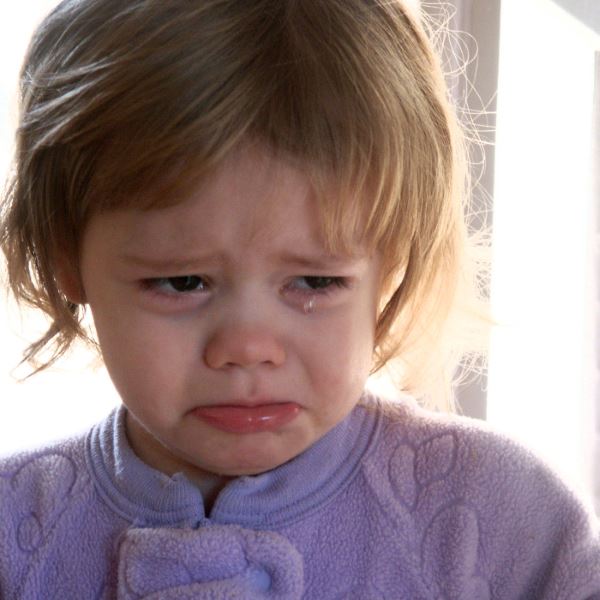 In the case of negativism, babies give up their own desires, even if they coincide with the requirements or suggestions of mom or dad. That is, children do not want to do something just because the initiative comes from a close adult.
In the case of negativism, babies give up their own desires, even if they coincide with the requirements or suggestions of mom or dad. That is, children do not want to do something just because the initiative comes from a close adult.
Let's look at the differences with specific examples:
- An example of disobedience. The kid played in the street. Mom calls him to eat, but since he has not walked up yet, he refuses to go into the house. That is, the basis of his behavior is the desire to take a walk, contrary to his mother's demand to return home.
- An example of negativity. A kid playing in the street is called for lunch, but they are categorically against it, although they are already tired of walking and hungry. That is, the refusal is due not to a lack of playing time, but to the desire to confront their mother, although their desires in this case match.
Thus, negative reactions are always targeted and directed not at the content of the request (requirements, wishes), but at a specific person. Usually the "object" is the mother.
There is no need to put pressure on the child or force him to perform the desired action. Let him “cool down” a little, and only then contact him with a request. Alternatively, another family member, for example, dad, can act as a “negotiator”.
Obstinate behavior is somewhat reminiscent of negativism, but it is distinguished by impersonality, that is, it is not directed at a specific family member, but at the usual way of life.
We can say that in this way the child protests against all the objects and orders that surround him.
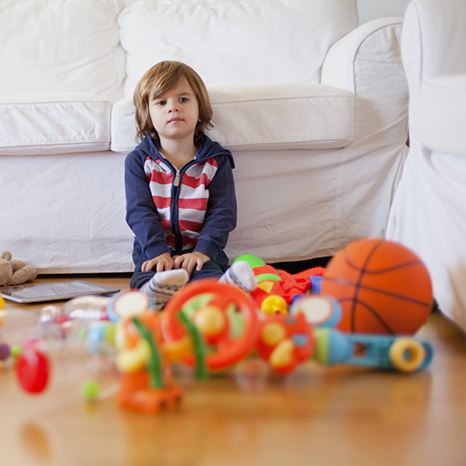 The psychology of young children is such that obstinacy is more likely to manifest itself in those families where there are discrepancies about upbringing and disciplinary measures between mother and father, parents and the older generation.
The psychology of young children is such that obstinacy is more likely to manifest itself in those families where there are discrepancies about upbringing and disciplinary measures between mother and father, parents and the older generation.
An obstinate child generally does not want to fulfill the requests and reasonable demands of all adult households, as if he does not hear the speech addressed to him. For example, the baby continues to play with blocks, despite the request of mom and dad to put the toys in the basket.
If the child is not going to fulfill your request right now, try to switch his attention to another activity. After some time, he will, for example, remove toys or wash his hands on his own, and you will not have to “stand over your soul.”
Stubbornness
Stubborn behavior should not be confused with persistence. In the first case, the child stands his ground only because he has previously demanded it. Perseverance is a manifestation of the will that allows children to achieve the desired goal.
Consider the difference between these qualities with specific examples:
- An example of perseverance. The kid categorically refuses to go to the table until he completes the tower of cubes, which for some reason is constantly collapsing.
- An example of stubbornness. You call the baby for breakfast, but he refuses, because before that he said that he was not hungry (although in fact this moment he got hungry).
There is no need to convince the child or, again, insist on his own. The best solution is to leave breakfast on the table and invite the baby to eat when he is hungry.
Despotism
The child seeks by all means to force his parents to do what he needs, even if it is a momentary desire. That is, children's despotism can be called a kind of desire for power over the mother or father.
For example, a baby may want his mother not to leave him even for a minute. If there are several children in the family, then the child begins to show jealousy towards his brother or sister - he takes away toys, does not want to go out together, pinches surreptitiously, etc.
This behavior is an example of manipulation. Therefore, try not to follow the lead of a little despot, at the same time showing that your attention can be attracted by peaceful means, without conflicts and hysteria.
At 3 years old, children often stop appreciating everything that previously seemed very important to them.
 Moreover, this applies both to close people and to inanimate objects and rules of conduct.
Moreover, this applies both to close people and to inanimate objects and rules of conduct.
Before, it would seem well-behaved child starts throwing away his favorite cars, tearing off the hands of dolls, tearing pages out of books, pulling the cat's tail painfully.
At this age, kids are often rude to those close people who used to enjoy authority. For example, a baby can tell her grandmother that she will hit her, and she can call her mother a fool.
In addition, the vocabulary of three-year-olds is actively developing, so rude and even swear words begin to appear in their vocabulary. Children actively use them to get a bright negative reaction from their parents.
It is important to switch the attention of the child with other toys - instead of a doll, offer a car. Regularly watch cartoons with your baby and read books on the rules of behavior with people, you can also play the situation in story games.
willfulness
Children 3-summer age strive for maximum independence, it is not surprising that this period is also called the “I myself” identity crisis. The kid tries to manage on his own, regardless of the situation and his own limited abilities.
Of course, it's good if the child, for example, tries to lace up his shoes or put on a jacket. But it’s a completely different matter when he pushes away his mother’s hand when crossing the road or tries to turn on electronic devices without the permission of his parents.
The independent behavior of the child is the key to acquiring precious experience. Even if the children do not succeed the first time, there will be an opportunity to learn from their mistakes. However, impose bans on those actions that can harm the child or other people.
Protest behavior is a child's reaction to pressure from significant adults who demand breakfast at the same time, not screaming in the street, not breaking toys, etc.

The result of parental diktat is a rebellion in the form of refusal from the usual actions (the baby does not want to eat on his own), tantrums, outbursts of anger and other negative manifestations.
Constant tantrums are not as simple as it might seem at first glance. Such reactions are a kind of stress that lead to malfunctions in the body's defense system. If the accumulated tension does not come out, auto-aggression occurs.
During the protest "actions" try not to lose your temper, listen to the opinion of the child. If he rebels against the security measures (wants to play with the ball on the road), do not go on about it and do not change your mind.
First of all, mom and dad need to understand that such features of the child's behavior are not bad heredity or congenital harm. The little man is growing up and striving for greater independence, which means that you need to build a completely different format of relations with him.
A correct understanding of the meaning of the crisis of three years is also important because at this age the baby accepts his "I", he forms an initial self-esteem, that is, a child's personality is born.
To minimize the severity of the negative manifestations of the crisis period, adults should heed a few recommendations from experts:
A kid at the age of three does not always go against his parents, especially if he is not forced, but asked. Wise parents do not drag a resisting child across the road, but ask him to take his hand and lead him to the other side of the roadway.
Fighting tantrums
The third year of a child's life is the time for the appearance or intensification of hysterical reactions. The crisis of three years increases their intensity, so advice to parents on fighting and preventing tantrums will come in handy.
- To prevent an emotional outburst, it is necessary to negotiate with the child in advance. For example, before visiting a toy store, agree on what exactly you will purchase. Of course, this will not help in 100% of cases, but the likelihood of hysteria will be significantly reduced.
- In the midst of an affect, you should not explain anything to the child. Wait until he comes to his senses, and only then discuss why his behavior (but not him) seems bad and unworthy to you. Be sure to tell your child about your feelings, even negative ones.
- In the case of public hysteria, it is necessary to deprive the child of "spectators". To do this, you need to either take him to a less crowded place, or try to distract attention with a flying bird or a running dog.
Well, since the leading activity for three-year-olds is a game, all situations that lead to tantrums should be lost. “Shop” with the dolls, “feed” the toys, pretend going to the clinic, etc.
Psychologists have proven that the crisis of three years is an obligatory and natural milestone in child growing up. However, the presence of the negative signs described above, or rather, their excessive severity, is an optional condition for the development of the child.

Sometimes the crisis period proceeds quite smoothly, without obvious symptoms and is characterized only by the appearance of certain personality neoplasms, including:
- the child's awareness of his "I";
- talking about yourself in the first person;
- the emergence of self-esteem;
- the emergence of strong-willed qualities and perseverance.
As already noted, the crisis will proceed much milder if parents take into account the age and individual characteristics of the baby when choosing the best educational measures.
In general, three-year-olds have some common behavioral traits that are worth mentioning in more detail in order to take them into account when communicating with a baby:
- Children try to get end result their actions. For a three-year-old child, it is important to complete the task, whether it is painting or washing dishes, so failure often does not stop him, but only stimulates him.
- The baby loves to show the result to adults. That is why parents need to give positive assessments of the results of children's activities, because a negative or indifferent attitude can lead to a negative self-perception in children.
- The emerging self-esteem makes the child touchy, depending on the opinions of others, and even boastful. Therefore, parents' inattention to children's experiences can become a source of negative self-determination.
Thus, the appearance of one's own "I", the ability to achieve one's own and dependence on the assessments of loved ones become the main results of the crisis of the age of three and mark the transition of the child to the next stage of childhood - preschool.
The crisis of 3 years of age is not a reason to panic and consider your child bad and uncontrollable. All children go through this period, but it is in your power to make its course as painless and fruitful as possible for the baby. To do this, you just need to respect him as a person.
Hello, I'm Nadezhda Plotnikova. Having successfully studied at SUSU as a special psychologist, she devoted several years to working with children with developmental problems and advising parents on the upbringing of children. I apply the experience gained, among other things, in the creation of psychological articles. Of course, in no case do I pretend to be the ultimate truth, but I hope that my articles will help dear readers deal with any difficulties.
Crises in the psycho-emotional development of a person are familiar to everyone and everyone, and not by hearsay. There are periods in life when the established conditions of existence cease to correspond to new opportunities, needs and views on the surrounding reality of a dynamically developing personality. The crises of transitional and middle ages are vivid examples of this. But it turns out that even very young children experience such turning points in their lives. One of which is the crisis of three years in a child. When the baby realizes that he is an independent person. And he is trying to start positioning himself like that among his relatives. And those are far from always ready for the manifestation of new qualities in the crumbs. Then stubbornness and obstinacy, self-will and despotism come into play. As a means of struggle of the inner "I" little man for equality and justice. The transition to a new model of relationships is inevitable. But it is quite possible to avoid complications and emotional conflicts. If you understand the essence of the problem and accept your child as he has become - matured and independent, able to make decisions and take actions.
Crisis of three years It is customary to call abrupt changes in the child's behavior due to objective physiological and psychological reasons.
Around the age of three, the child begins to perceive himself as an independent person.
However, the age indicators for such changes in this formulation are very conditional. It all depends on the characteristics of the development of each individual baby. For some, this period will come earlier, for others later.
Around the age of three, the child begins to perceive himself not as part of his mother, but as an independent person. And everything that used to be taken for granted, his new "I" calls into question.
The baby realizes that his desires and needs do not always coincide with what his parents want from him. But how do you communicate this to others? How to declare your new worldview?
The kid doesn't know it yet. And he tries to act using those behaviors that he has observed in adults, or in other children. The first such attempts are very imperfect and clumsy.
It turns out that acting like an adult is not so easy. Hence the confusion and nervousness. Hence - internal conflicts that tend to find a way out. Hence - emotional instability, rebelliousness, negativism.
Psychologists consider the crisis of three years in a child to be an absolutely normal and quite natural phenomenon, which is not a deviation and does not require the intervention of specialists (with the exception of very rare cases).
But parents are advised to familiarize themselves with its signs in advance and develop tactics of behavior. Then the maturation of their child, his formation as a person, will not be marked by tantrums and scandals, mutual insults and accusations. And it will be painless and even pleasant.

Among the manifestations of the crisis of three years - negativism, stubbornness, demonstrative behavior, tantrums, aggression
"Informed means armed." If you know the symptoms of a three-year crisis, it will be easier for you to recognize it. So, you can act adequately, and do not commit common mistakes. This, for sure, will help to cope with the situation without unnecessary complications and upheavals.
What can indicate a crisis 3 years old The child has?
- The desire to do everything and always do it yourself.
- A violent reaction to failure.
- Unwillingness to fulfill the requests of parents, follow their advice.
- Stubbornness, sometimes bordering on recklessness.
- Self-will and obstinacy.
- demonstrative behavior.
- Frequent .
- Despotism, manifestation of aggression towards others.
- The emergence of fears (silence, darkness, heights, loneliness, etc.).
It is not necessary that your baby will have all of these symptoms. For some, this turning point goes almost unnoticed. And for some parents, at times, it seems that someone just replaced their beloved little one.
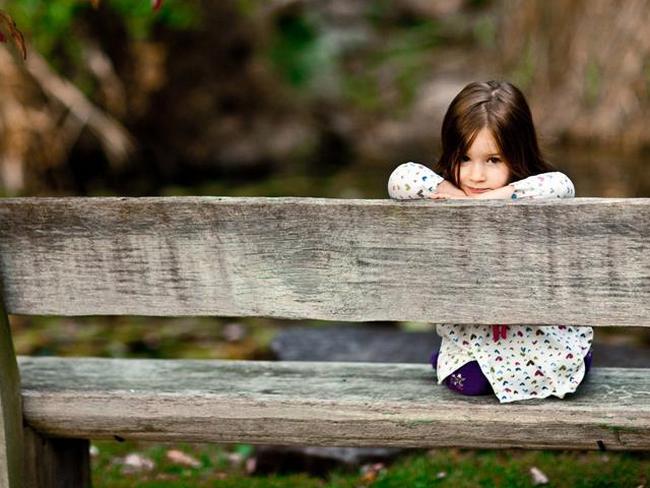
Lack of attention causes a feeling of protest in the crumbs
Causes and background
What determines whether it will be difficult for your baby to survive the crisis of three years, and, of course, for you along with him? It turns out that often adults themselves, choosing the wrong tactics of behavior, provoke complications in relationships with their crumbs.
But what are the reasons why the relationship with the little one, instead of smoothly transforming and reaching another level, on the contrary, comes to a standstill?
When is a crisis inevitable?
- When a child is forced to fight for the assertion of his personality.
The unwillingness or inability of parents to adapt to the fact that their baby is already quite adult for such elementary things as eating, getting dressed or, for example, helping with something around the house, most often leads to conflicts. Mom and dad, out of habit, continue to behave with him as with a baby. Thus, in no way contributing.
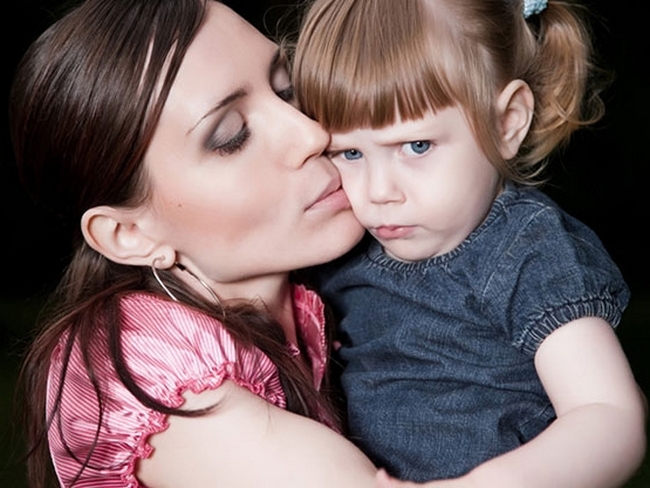
Hyper-custody on the part of parents in no way contributes to the development of independence and a sense of self-confidence in the child.
- When a baby is treated unfairly.
The child is very sensitive to your actions in relation to him. And if you systematically punish him for no good reason, if you promise something, and then do not fulfill your promises, tell a lie to the baby, etc., then the baby is gradually disappointed in his loved ones, ceases to trust them. And without trust, normal relationships in the family cannot be built.
- When parents devote too little time to their baby.
And there are situations when a mother, realizing that the baby began to need her much less than before, begins to devote less and less of her time and attention to him. And the baby feels deprived of maternal warmth, care, love. If the closest people do not notice the baby and do not delve into his problems, then why should he hear and listen to them?

Do not scold or punish the little one without first understanding thoroughly who is right and who is wrong
- When the little one is not sure of himself.
There are many schemes. Too authoritarian or overprotective parenting style is not the best of them. By limiting the child's self-expression and controlling his every step, you run the risk of creating a sense of self-doubt in the child and instilling in him an inferiority complex. Hearing constant criticism addressed to him, the baby will either have to somehow respond to it, or withdraw into himself and experience everything in splendid isolation.
But even if you try to avoid mistakes in raising your beloved child, you are by no means immune from manifestations age crises him. Perhaps they will not be so pronounced, but they are inevitable.
Another thing is that in each such crisis, in spite of all the difficulties that usually accompany it, there is certainly a positive content.
The child should be able not only to obey, but also to defend his point of view
Positive sides
In the process of forming his own "I" of a three-year-old toddler, in the process of separating his personality from the personality of his mother, the baby learns to express his point of view. Be guided by your own opinion and fight back when someone else's is imposed on him.
A child who only knows how to obey will never be able to build equal relationships with other children in the team. For such a relationship, you need to be able not only to obey, but also to insist on your own.
This is what the crisis of three years teaches. It is inevitable, like the replacement of milk teeth with permanent ones. But if you understand and accept what is happening, it can rather be called another step personal growth child. Rather than a crisis as such.

At this stage, compromise is your main weapon. Learn to negotiate with your little stubborn
What does it mean to "understand"? And what does "accept" mean? How to respond to open disobedience, stubbornness and aggression of a recently obedient, adequate and quite contented child?
Psychologists advise parents when the first signs are found, first of all, be patient. Do not be offended by the baby, do not be angry with him and in no case show reciprocal aggression.
This transitional period can last from one to several months. Each toddler has their own way. Do not try at any cost to break the stubbornness of the little rebel and subdue him to your will.
Stay calm and learn to negotiate. Compromise is a solution that at this stage can satisfy both you and the little one trying to start managing his life on his own.

Don't be afraid to give your child instructions. It is very important for him to feel needed, to be a part of Everyday life families
Ways to overcome
And now - a little specifics. How to behave to parents so that the crisis of three years for their child passes painlessly and productively.
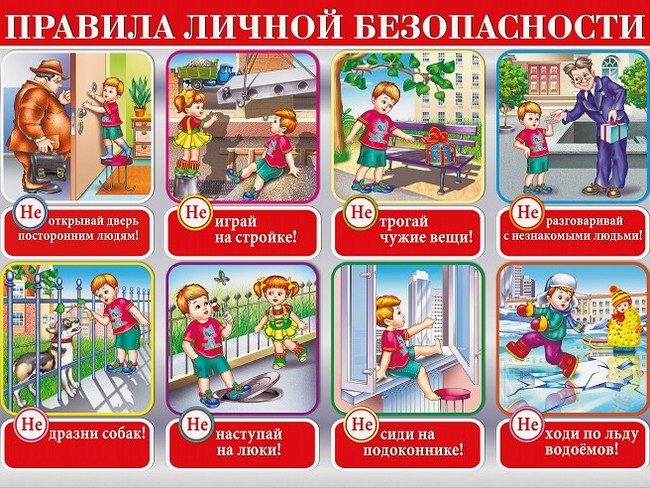

Give the child enough of your attention, love the baby with real parental love - tender and wise
Do not think that only you are having a hard time at this time. The child also has a hard time. And he must be sure that he will always find support in your face. If the baby understands that his parents understand him and are ready to help him in every possible way, his confusion, which gives rise to irritation and aggression, will gradually dissolve like a morning mist.
Love your child not with crazy and blind love, but with sincere and wise love. Parental love - faithful and tender, but somewhere demanding and strict. This is the only way you can find the golden mean and bring up a Personality in your child.
Video "The crisis of 3 years is useful"
More recently, your child was a sweet and affectionate baby, snoring in a crib, but a little time has passed, curiosity and a crisis of 3 years have come to replace it - this is how psychologists call the time when a charming little boy or girl turns into a capricious pest that does not give rest to any member of the family . It would seem that there are problems in education or character, but it is better to deal with the reasons more deeply.
The behavior of a three-year-old child during a crisis can change beyond recognition: it is important for parents to know in advance about the nuances of the upcoming test in order to get out of it as gently as possibleCrisis symptoms in children
- The child moves away from adults. There is a confrontation with adults - the baby wants to do everything on his own, any of your help will be taken with hostility.
- You have to come to terms with the desire to defend your "I", now your child feels like an adult.
- In the speech of a baby at 3 years old, one can hear wordings of this type: “I want”, “I myself”.
- The child becomes jealous and greedy, this is aggravated when the second baby is born.
- Stubbornness is manifested in every detail - whether it is a desire to walk longer, buy a toy or not eat porridge.
- Harmfulness is another feature, if you ask a child for something, he will do the opposite, and not because he wants to, but only out of a desire to play pranks.
- Unreasonable aggression appears, sometimes it comes to swearing at adults, hysterical crying, children's screams, bites and tantrums, in such a situation it is not worth indulging whims, referring to the crisis of three years, you risk growing an uncontrollable person.
- The kid needs a lot of attention - even leaving him for a minute, you will face aggression against you - you can be accused of almost betrayal.
- During the crisis of 3 years, the child wants to be the best in everything, feeling parental support - achievements should be praised in order to evoke a sense of pride.
Causes of the crisis in 3 years
The causes of the crisis are due to growing up little man. If before he felt like a defenseless creature, now in inner world significant changes have taken place: it seems as if he is already an adult, dissatisfied with life. Parents at this time behave in a strange way: they try to patronize, which causes aggression.
The acute form of the crisis is due to incorrect family education if mom and dad deprived the baby of independence, did not allow him to make decisions, constantly took care of him. Often, young parents are characterized by inconsistency in behavior: dad allows, and mom forbids toys. All this will lead to a crisis of 3 years.
How long does the crisis of three years last?
The crisis of 3 years has no clear boundaries, the uprising against the authoritarian family structure can begin at 2.5 or 3 years. The course of this time and duration are determined by upbringing, by the efforts that parents make to overcome a difficult age. It may take about a year for the baby to become a habitual child again, in most cases the situation becomes stable by 4 years.
 The crisis of 3 years is a conditional concept, since a child can “reign” even up to 4 years of age
The crisis of 3 years is a conditional concept, since a child can “reign” even up to 4 years of age How can you help your child get through this time?
- To avoid the occurrence of a crisis of three years, do not use an authoritarian, excessive guardianship will lead to the fact that in the end you will raise a room child, this will create a lot of problems in later life. Overprotection never did any good.
- Parents should adhere to one upbringing system, this should be agreed in advance by discussing the details and finding out controversial points, resolve issues with grandparents - they often pamper their grandchildren without listening to you.
- Behave calmly, not succumbing to the provocations of the little tyrant, he must understand that tantrums and tears will not unbalance you, exclude manipulations, show that it will not be possible to achieve the fulfillment of desire with screams.
- Do not argue with the child, trying to impose your point of view on him, at the age of 3 the baby can already make decisions on his own, if earlier you fenced him off from many things, now it's time to explore the world without prohibitions - let him feel independent.
- You should not command the baby either, this will increase the nervous tension, and the attitude will deteriorate, it is better to show restraint, let the child think that he makes the decision on his own.
- You should not force him to take food, if there are signs of a crisis of three years, let the child choose the duration of the meal himself, ate - he can go, perhaps he is simply not hungry, and you impose your position, normally the baby himself knows how much food he needs.
- A three-year-old child needs independence: if he wants, he can sweep the floor, wash the dishes, water the flowers, or even take part in the laundry - small household chores will form a love of hard work, even if it doesn’t work out very well, praise him.
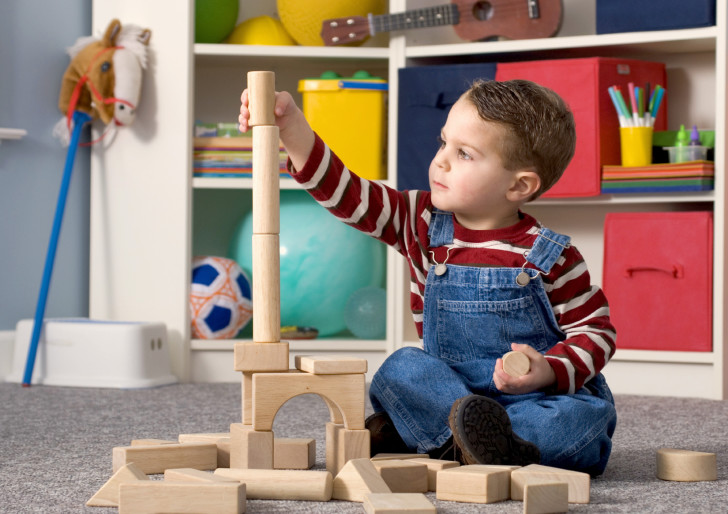 During a crisis, independence is very important for a child - it is worth allowing the baby to join adult activities, letting him make an independent choice
During a crisis, independence is very important for a child - it is worth allowing the baby to join adult activities, letting him make an independent choice - The psychologist's instructions will help to cope with difficulties, if you want to avoid conflicts, behave accordingly: ask the child's permission in everything that concerns his person, go for a walk - find out what clothes he will wear, cook dinner - ask what he wants.
- Be reasonable - give in to the little things, for example, if today the baby wants to eat a second course before soup, nothing bad will happen, there is nothing wrong with wanting to take these toys into the yard either.
- Make compromises - let the baby choose the best solution for him, parents do not need to set ultimatums.
- Learn psychological features your child, the children's body is individual, pay attention to the weaknesses of the child, build upbringing not on punishment, but on positive encouragement.
- If the child is not coping, you do not need to do everything for him, it is better to just offer to help. If you encounter aggression, do not insist, let the baby do everything as it comes out, you can redo it without him.
- The manifestation of warmth and affection is the right way to overcome crisis phenomena, you need to take care of the baby, hug and praise him more often, this will form self-confidence in the growing prankster, and will make him feel loved in the family. Especially children who are forced to share love with their brothers and sisters need such gestures.
- If you can’t cope with the situation on your own, and the tense situation in the family increases, it is better to turn to the help of a professional child psychologist.
 Do not be afraid to contact a psychologist with your child - a specialist will simply help you calmly survive the period of crisis and tell parents what to do in specific situations
Do not be afraid to contact a psychologist with your child - a specialist will simply help you calmly survive the period of crisis and tell parents what to do in specific situations - Constant swearing will lead to the fact that the child will be disappointed in you, psychology helps parents: you should not break loose over trifles, a broken cup will not become a tragedy, and soiled pants can always be washed, while negative behavior will lead to a guilt complex in a growing personality, and this threatens already more serious consequences in adult life.
- Game techniques will help turn routine activities into fun and carefree time spent together, it will be easier to eliminate the crisis of three years - you will understand how good this upbringing technique is. Your favorite toys will come to your aid: the doll wants to eat only with the baby, the bear does not go to bed alone.
- A difficult age lasts a long time due to the fact that you choose the wrong tactics of behavior: you should not compare the successes of your child with other children - a feeling of inferiority may form, the child will begin to treat other children negatively. It is better to compare successes with his own example.
- The character of the child will be hopelessly spoiled if you constantly insult him: a bungler is far from the best definition of his skills, even if the baby cannot do anything himself. Praise the drive, offer a little help to make it even better.
Crisis 3 years in a child- This is a relatively short stage of life, which can be characterized by a duration of several months, and sometimes up to two years. The child changes noticeably during this stage, moving up a step in his own life path. After the baby has crossed the line three years of age his adult environment begins to notice serious modifications in him: the child becomes stubborn, changeable, capricious, absurd.
Causes of the crisis 3 years in children
Unfortunately, the vast majority of adults do not realize that given period development is characterized by a mental process that is quite important for the baby, which consists in the appearance of the first vivid expression of one's own "I". Thus, children's behavior is an attempt to learn how to do things on their own and find solutions to their own problems.
There are several manifestations, the knowledge of which will help parents determine that the baby is approaching the crisis stage. Children have a keen interest in reflecting their own person in the mirror, they begin to be puzzled by their own appearance and reveal an interest in how they appear in the eyes of the environment, and children also begin to react sharply to failures.
Vygotsky considered the crisis of 3 years to be the most difficult stage on the path of growing up kids. The new needs of a three-year-old baby are no longer satisfied by the previous model of interaction with him and the previously established way of life. Therefore, he protests, in order to defend his own “I”, he behaves in defiance of his parents at the same time, feeling a contradiction between his “want” and “need”.
This is how the child develops. Any process of development, except for slow changes, is accompanied by abrupt crisis transitions. Gradual accumulation of personality changes are replaced by violent turning points.
Crisis symptoms 3 years
During periods of crisis, children are characterized by a special sensitivity to assessing their own person and their actions. They become more touchy, slightly vindictive (they remember a long period of time, undeserved, in their opinion, punishment), cunning (show feelings and attitudes that they do not feel).
Vygotsky described the crisis of 3 years as a "seven star of symptoms". The first signs of a three-year crisis are the appearance of negativism and an increased desire for independence.
Negativism is an attempt by the baby to show his own independence. In other words, the baby answers in the negative to any proposal heard from the parents - “no” becomes his favorite word. For example, a mother calls the child for dinner, but what she gets in response is “no”, but after 10 minutes the baby can come by himself. By such behavior, he demonstrates that he decides whether he needs to dine or not. Such actions are not a response to the content of the proposal. This reaction is directed at the sender of the offer. A child going through a crisis stage of development only strives to do the opposite, even if it goes against his desires.
Crisis 3 years of tantrums become a constant companion of the crisis stage, which can puzzle and upset parents, as a result of which they will look for the reasons for such actions in deviations in mental development. Children's attempts to delimit their own "I" from their parents are progressive developmental trends.
The crisis of 3 years, the symptoms and main manifestations were first described by E. Koehler. She singled out the following symptoms of a three-year crisis: negativism, obstinacy and stubbornness, self-will, protest rebellion, devaluation of adults, aspiration to despotic behavior. However, behind this composition of negative characteristics, the parent should try to discern the child's attempts to establish qualitatively new forms of relationships with the environment and highlight his own "I".
Often, three-year-old children accompany any of their actions in response to the suggestions of their parents with the words: "I myself." The phenomenon of the phrase “I myself” means not only independence in actions, but also the psychological separation of the baby from the adult. And the sooner the parent realizes the need to transform the relationship with the baby and rebuild them, the less negative the manifestations of the crisis will be.
Stubbornness and negativism in childish behavior arises due to the fact that children still do not know how to evaluate their own state, are not able to understand and explain their intentions. That is why their behavior seems to be a senseless confrontation with adults.
Children in crisis period three years of age are characterized by excessive perseverance, which sometimes reaches the level of perseverance if the baby wants to achieve something specific from an adult.
A crisis of 3 years in cases where children do not get what they want is observed quite often. To avoid them, parents should try to switch the attention of the crumbs from a situation that provokes a conflict to an object or phenomenon that will definitely interest him. The main thing is to behave in a balanced way. Since parental cries can only aggravate hysterical manifestations.
Stubbornness is also a trait inherent in babies in the crisis period of three years. It manifests itself not because the baby wants some specific thing, but because he needs what he requires to be done. The kid is simply bound by his own initial decision.
Obstinacy in the behavior of children is directed against the system of education, a way of life that has been established for up to three years. The baby may start to indulge when the parents watch TV or cook.
Self-will is manifested in the desire to do everything independently. The child wants to make himself a sandwich, tries to make his own bed or tie his shoelaces. This behavior is the first manifestations of his adulthood. At this stage, the baby is already beginning to realize the difference between adults and children, as a result of which it strives to be like an adult environment.
Protest rebellion is expressed in a state of opposition to others, often even, it can be manifested by "military actions" in relation to them. Children tend to be rude to their grandparents, argue with their mother. Often, children who have crossed the three-year mark quarrel with their peers, take away toys from them or do not want to share their own, often even fight.
The devaluation of adults is expressed in the fact that the baby begins to scold, tease, often, even call his parents names. Children refuse to admit their own wrong and do not ask for forgiveness for harshness.
Children's despotism forces parents to do everything that the kids demand. They try to manipulate their parents with unbridled roar, rude treatment, capriciousness. In relation to younger kids in the family, it is a despotic manifestation.
Thus, the crisis of three years, the symptoms and main manifestations help parents understand what is happening with their children, so that they can correct their behavior in a timely manner, as a result of which three year crisis will pass for the crumbs the least noticeable.
Toddlers who have overcome the three-year milestone begin to expect from adult participants family relations recognition of their own autonomy and independence. They want their opinions to be considered and consulted. Children cannot wait for their desire to be independent to be fulfilled. They do not yet understand the future tense. They need everything immediately, as a result of which children strive at any cost to achieve independence and assert themselves in victory, even if such a victory brings inconvenience due to a quarrel with a close environment.
Parental care can be represented as eggshell protecting the chick embryo. It is safe, warm and cozy for the baby to be under it, but at some point it builds obstacles in the way of its growth. Therefore, the child does not instinctively, but already consciously breaks the “shell” in order to know the vicissitudes of fate, to experience the unknown and the unknown. And his main discovery is the discovery of himself. The child begins to feel independent, and in some way omnipotent, however, due to his own age capabilities, he is not able to do without his parents. Therefore, he begins to get angry with them and take revenge with the only means available to him - tears.
Psychology characterizes the crisis of three years as the driving force of child development, which is a change in the leading activity. The end of this stage marks the beginning of a new period - preschool childhood.
At the age of three role-playing game becomes the dominant activity. Toddlers practice games in which they imitate and imitate the adult environment.
Childhood crises can have adverse consequences, such as increased brain sensitivity to environmental influences, vulnerability of the central nervous system due to disturbances in the restructuring of metabolism and the transformation of the endocrine system. In other words, the climactic phase of the 3-year-old crisis in a child is a combination of a progressive evolutionary leap and a functional imbalance that is unfavorable for the child's health.
This imbalance is also fueled by the active growth of the physical body of the crumbs, respectively, and its internal organs. As a result, the adaptive capabilities and compensatory potential of the child's body are reduced, babies become more susceptible to various ailments, especially of a neuropsychic nature.
The crisis of 3 years in a child - how to deal with it? You can judge the affections of babies by identifying who his crisis is aimed at. Basically, this object is the mother. Therefore, the responsibility for the competent and favorable exit of the baby from the crisis is assigned, first of all, to her. You need to understand that the child itself suffers from crisis manifestations.
Psychology claims that the crisis of 3 years is one of the most significant periods of a child's mental development, which marks his transition to another step of childhood up. That is why it is recommended that parents, if they begin to notice drastic changes in the behavior of their own child, try to develop the right strategy in cooperation with him, become more loyal in educational measures, expand the rights and responsibilities of the crumbs, give him a taste of independence within reason, so that he was able to enjoy it.
You need to understand that the baby does not agree with his parents not out of simple stubbornness, he tries to test the character of adults and looks for weaknesses in him, so that in the future he will influence them while defending his own independence. Therefore, the baby can double-check parental prohibitions several times a day. And if he notices at least the slightest opportunity at which “it is impossible” is transformed into “it is possible”, then he will achieve his goal, if not from his parents, then certainly from his grandparents. It is still not recommended to be angry with him for such behavior. You just need to correctly balance the system of rewards and the order of punishments, follow the sequence of actions by all participants in family relations. After all, these are adult relatives from the moment the crumbs were born, systematically accustomed him to the understanding that the desires of the crumbs are the law for the inner circle. Therefore, one should not be surprised when the baby does not pay attention to adult prohibitions. The child cannot understand why the system of requirements has suddenly changed. Therefore, in retaliation, he will repeat to his parents “no”. You should not be offended by the crumbs for this.
In situations where the desires of the crumbs greatly exceed its real capabilities, it is necessary to find a way out of the situation through a role-playing game.
If parents have noticed a crisis of 3 years in a child and how to deal with it is an urgent issue, then they are advised to do everything possible so that the baby feels equal to his close adult environment.
